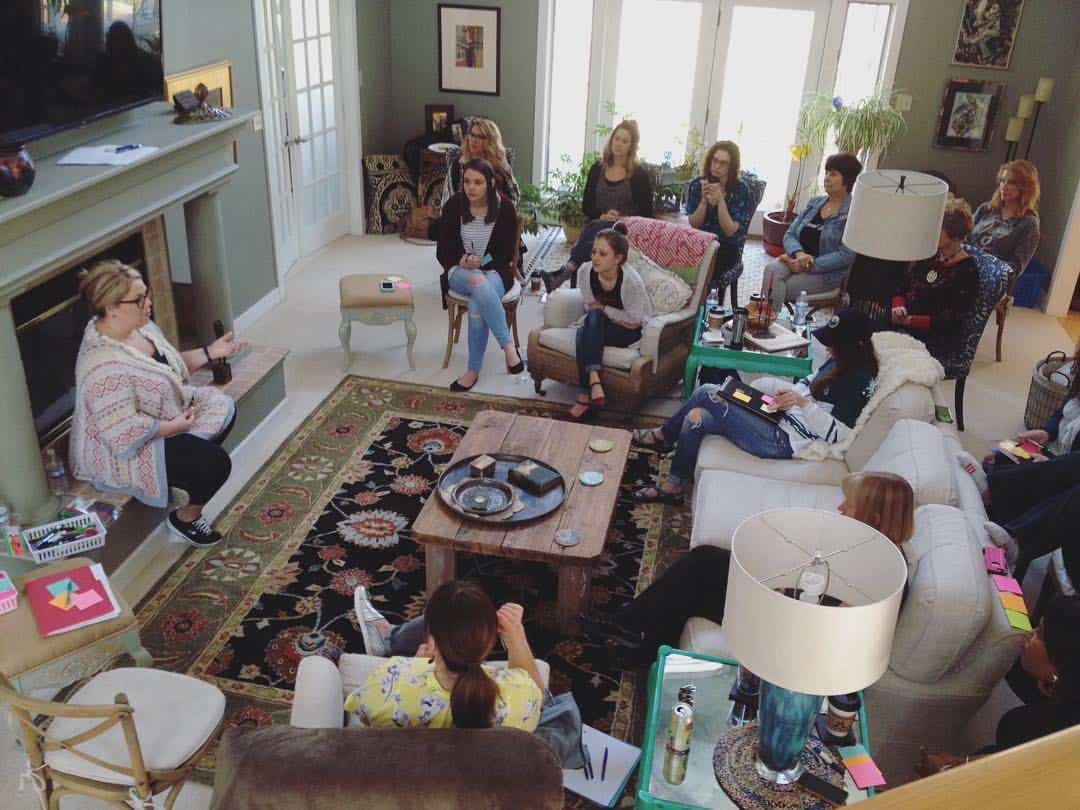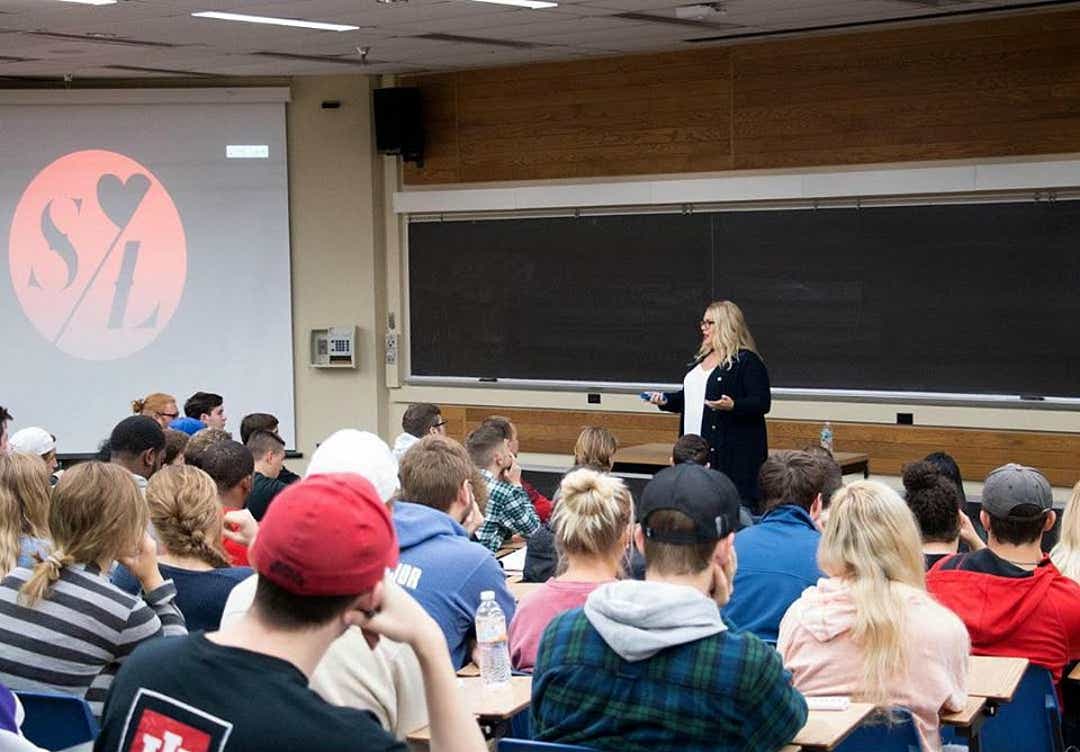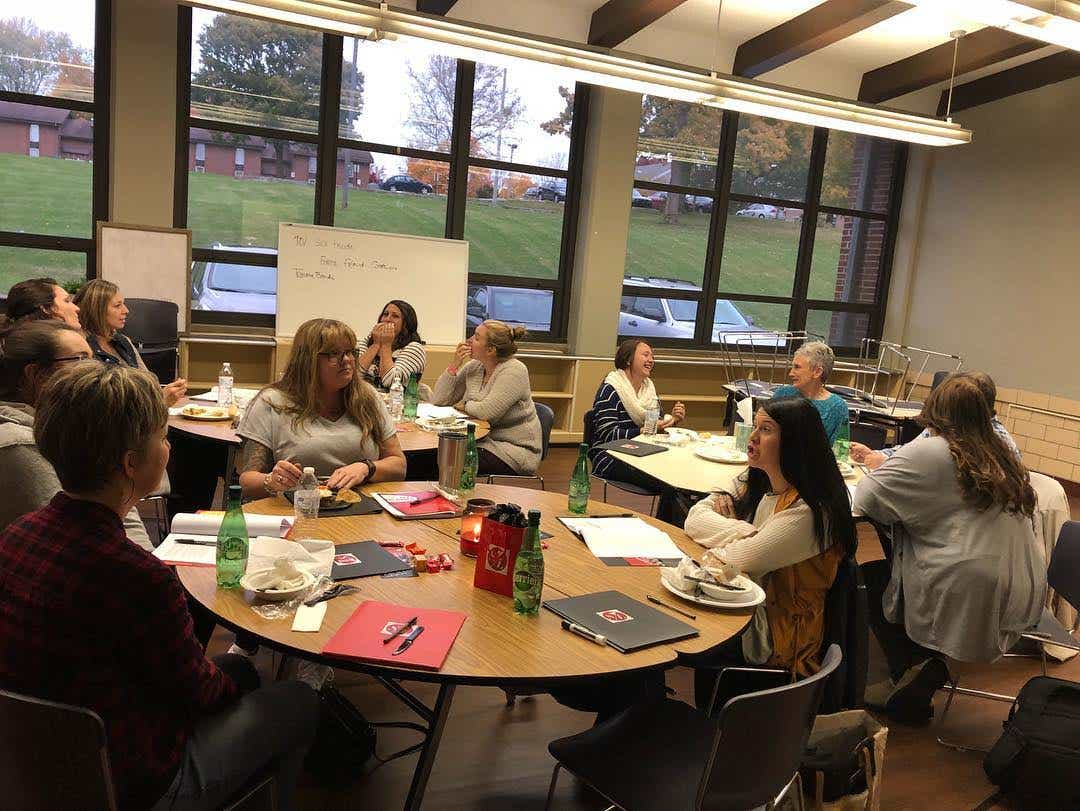
ANDERSON, Ind. — It started with a plate of cookies in a strip club.
Eleven years ago, Kimberly Majeski and a group of friends from Madison Park Church walked into Hoosier Girl with desserts and open hearts.
The group sat with the dancers before their shifts started. There was no push to read the Bible or show up to church next Sunday. They complimented each other’s nails and talked about hair products.
At the end of the night, the women asked why they visited.
“We’re just here to love you, no strings attached,” Natalie Farmer, a friend of Majeski’s, said.
To their surprise, someone replied, “We don’t get a lot of people in here who want to love us, no strings attached.”
From that night, trays of cookies turned into full meals every Wednesday before it was time for the women to go into the club.
By 2013, Majeski, an associate professor of biblical studies In Christian ministries at Anderson University, turned the meetings into a nonprofit, calling it Stripped Love.
“We just wanted to love these women who probably felt judged by the church or condemned by Christians and weren’t necessarily receiving the message of love,” Majeski said.
But as years went by and women began sharing their stories with the Stripped Love team, Majeski noticed a pattern.
At the time, a study on human trafficking stated 70% of women who were trafficked in the United States were trafficked into the sex industry.
“Most people believe it’s what we see in the movie 'Taken,'” Majeski said. “Most people believe it’s in India and the Philippines, but it’s happening here in Anderson and Muncie.”
Human trafficking in Indiana
While one of the biggest misconceptions surrounding human trafficking is “it can’t happen here,” almost every country in the world is affected, according to the United Nations Office on Drugs and Crime.
Human trafficking is defined as recruitment or transportation, with the use of threat or force and with the intent to exploit victims.
While sex trafficking is a high-profile issue, human trafficking also includes forced labor, slavery and organ harvesting.
But does it exist in Indiana?
Polaris Project, founded in 2002, is a nonprofit, non-governmental organization working to combat and prevent human trafficking in all forms.
For the last 10 years, it has run the National Human Trafficking Hotline, which receives reports of trafficking cases through call, text, email and online reports.
Since 2007, there have been 51,919 recorded cases, mostly involving women in sex trafficking.

In 2018, the most recent available data, 10,949 human trafficking cases were reported to the hotline, with 7,859 of them classified as sex trafficking cases.
Indiana ranked 22nd in the nation with 142 reported cases, up 46 from the previous year.
The Polaris Project data team confirmed with The Star Press the hotline received six calls about cases from Delaware County in 2018.
The organization warned that its data does not reflect the prevalence of human trafficking in the area, as most cases go unreported.
Polaris identifies the I-69 corridor from northeast Indianapolis to Anderson and Muncie and the Highway 31 corridor from Indianapolis to Marion and Kokomo as a “red zone” for human trafficking.
Part of the crossroads, Indiana is close to large cities in Illinois and Ohio, also hotspots for trafficking.
For Majeski, she believes poverty also contributes to the problem.
With central Indiana being in the rust belt, many young, single women are finding themselves living in poverty, often with children needing care, Majeski said.
The other part of the problem is how society views the women.
"There are no little girls who grow up dreaming of taking off their clothes and selling their bodies for a living," Majeski said. "When we talk about choice, we put (quotes) around 'choice.' What we’re talking about here is lack of access, lack of agency, lack of voice, lack of sense of self."
Taking on the clubs
While strip clubs are a legal and lucrative business, that doesn't mean they are necessarily free from trafficking, and many of the women coming to Stripped Love share the same narrative.
“The more I thought about it, all the women I knew were in the club because of force, fraud or coercion,” Majeski said. “She owed him some money. He told her, ‘Just dance for a little while and I’ll get you out of here.’”
Volunteers with Stripped Love are trained on club culture, how to relate and form friendships with women who are in trauma-bound relationships, how to report trafficking and keep case notes, and what to do during an emergency.
After entering the 22 clubs in Indy, six in Kokomo, four in Fort Wayne, two in Anderson and the (now closed) one in Muncie, Stripped Love had gained a reputation.
In the past 10 years, the organization has created teams and launched other ministries across the state. Its members have done training in several states, planting about seven teams in other cities.
Club managers onsite love them. Club owners who watch dancers walk out the door hate them.
Conditions on which they can visit change depending on the manager. Sometimes they can’t bring food. Sometimes they can’t bring gifts. Sometimes they’re kicked out altogether.
No matter what, Majeski said her team abides by the rules, respecting the place of business and not hindering the dancers' work.
“We build authentic friendships. It isn’t contrived; it is authentic. We genuinely love and care for these women,” Majeski said. “For 10 years, we’ve shown up at these clubs and have sat with them in the place of their mess, the place of their pain, and we’ve become safe people on their terms, on their turf.”
Expanding the love

About four years ago, Stripped Love acquired a space at the Park Place Community Center.
At the same time, Joker’s Wild, Muncie’s last strip club, was demolished. While at first some people applauded its demise, it soon became difficult for Stripped Love to locate and help the women it had employed.
“People don’t realize the trafficking doesn’t stop; it’s just the building isn’t there,” Majeski said. “Everything goes online or underground.”
To bring those women back to the organization, Second Sundays were created, offering a coffee break for the women and play time for their children.
The once-a-month event grew from three people to 50, and with it, Stripped Love was able to focus on children who might be in danger of falling through the cracks.
With a children’s ministry director, the organization now works to demonstrate boundaries and healthy relationships with adults.
Stripped Love also hosts an annual back-to-school party and Christmas party, providing children with all their school supplies and whatever they ask from Santa.
“Most of the women we serve have children and many of them are fighting for custody, many of them are hoping the same thing that happened to them won’t happen to their children,” Majeski said. “Many of them want meaningful experiences for their children, which they can’t afford or facilitate.”
'There’s some sisterhood'
Joshua Brandt, pastor of The Gathering church in Muncie, has known Majeski for more than 20 years, but he didn’t know what impact Stripped Love would have on his church.
At first, talking about human trafficking, sex trafficking and strip clubs on Sunday morning seemed odd, but now, it’s normalized.
“I didn’t even realize the impact of that until there was a training,” Brandt said. “I was on Facebook and saw a training and I was like, ‘Wait a minute, 1/3 of those women being trained to be volunteers are from our church.’”
Four years ago, The Gathering, a Muncie branch of the Church of God Ministries in Anderson, started financially supporting Stripped Love. Later, Brandt began serving on their board.
Now a “freedom partner,” The Gathering donates $5,000 or more a year.
Over the past decade, the church has narrowed the number of organizations it supports in order to dedicate more time to each. Stripped Love is talked about on Sundays two months out of the year.
“Five years ago, almost everyone in our church would’ve said, ‘Oh, women are working in clubs because they’ve chosen that life,’” Brandt said. “But now, most people in our church, if somebody said that, they’d correct it and say, ‘No, that’s not what’s going on. Let’s talk about all the factors.’”
The Gathering has a core group of Stripped Love volunteers, regularly going into the clubs.
Sometimes, they bring the women to church on Sunday morning.
Brandt has seen it before. It was three friends, then four, now there’s five. They sit right next to him during the 9 a.m. service.
“That new friend that comes with them all the time is someone they loved into a thriving, healthy relationship with the community,” Brandt said. “That would be awesome, and if it’s still five years out when it happens, it’ll still be awesome.”
Members from the Gathering and Commonway Church, another Muncie congregation, make up a majority of Stripped Love’s volunteers.
“Since the very first telling of our story, they’ve been behind us, with us and for us. They get it,” Majeski said. “They knew they needed to, wanted to and had a passion for serving their communities.”
"I think there are some similar organizations in Indy and Chicago that do similar things, but they’re not rooted in this area," Brandt said. "We just really believe that Delaware County and Madison County, there’s some sisterhood in those two counties. There’s a uniqueness here."
The next 10 years
Starting out with Majeski and her closest friends, Stripped Love now has more than 20 volunteers.
The nonprofit offers free counseling, medical services such as pregnancy tests and emergency exit housing for those who meet certain criteria. Now, in 2020, the group's biggest goal is to help invest in the dreams of children.
On average, Stripped Love has helped five women completely transition out of clubs or trafficking every year, for a total of 60 women so far.
“It’s been incredible to watch these women who have been trafficked, who are victims of exploitation, kind of move forward to understand who they are,” Majeski said. “We always say we want them to first believe they’re loved by God and then wake up to their dreams.”
The focus will be on gaining more church partners, making sure churches understand the vision and the predicament of women in their communities.
Majeski hopes to grow the number of staff and volunteers, so that one day, residential help can be possible.
“I cannot tell you the heart surge it is to watch women who have sacrificed time, who don’t get paid, who clean and sweep floors, who bake cookies, who sit in Wendy’s parking lots with women who are in crisis, who hold hands, who wipe tears, who rock babies, who show up to do that, that’s what’s inspiring,” Majeski said.

For more information, visit strippedlove.org.
To contact the Human Trafficking Hotline, call 888-373-7888 or go to humantraffickinghotline.org/ to report a tip.
Charlotte Stefanski is a reporter at the Star Press. Contact her at 765-283-5543, cstefanski@muncie.gannett.com and follow her on twitter @CharStefanski.
"love" - Google News
February 18, 2020 at 07:11PM
https://ift.tt/323Jepk
Stripped Love: Women helping women out of the sex industry - The Star Press
"love" - Google News
https://ift.tt/39HfQIT
Shoes Man Tutorial
Pos News Update
Meme Update
Korean Entertainment News
Japan News Update
Bagikan Berita Ini














0 Response to "Stripped Love: Women helping women out of the sex industry - The Star Press"
Post a Comment